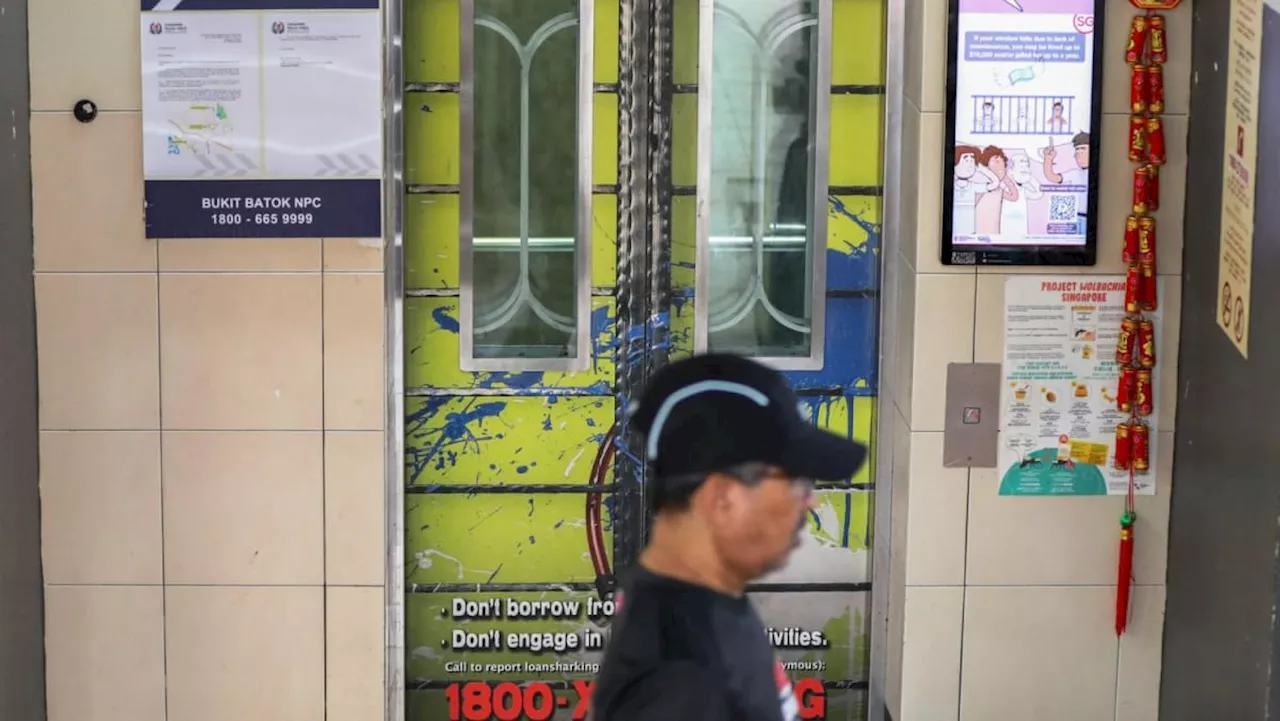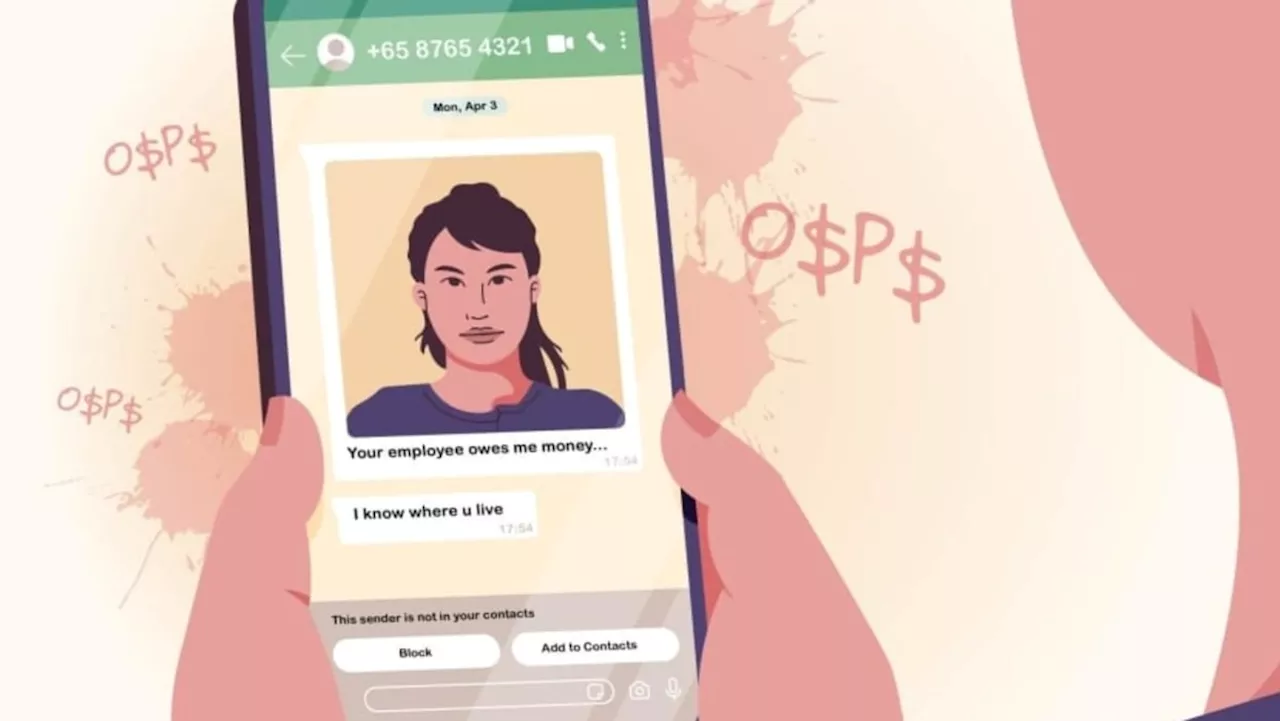SINGAPORE: Mr Alan had no idea that his employee had borrowed from “loan sharks” until he was harassed with almost 120 calls over three days from various unlicensed money lenders.
While harassment from unlicensed moneylenders, or loan sharks, is nothing new, some illegal lenders have adopted new technologically savvy means.
While this happened in 2017, Mr Alan received a call from a stranger looking for his ex-employee last year. Mr Sebastian Pereira, a sales manager and delivery rider on Foodpanda, also had a taste of another loan-shark tactic last year. The other riders, from platforms such as Grab and Lalamove, also had cash-on-delivery orders for the same address placed under a similar username, but the resident had not placed any orders.
The intimidation tactics escalated when harassers sent raw pork on two occasions via cash-on-delivery orders through Foodpanda and Grab. For Ms Ika Lestari, the aftermath of her former helper borrowing money from unlicensed moneylenders was two months of calls and messages from various numbers, mostly Malaysian, threatening to burn down her house this year. Mr Sharif denied ever taking any loan and the police did not find any evidence that he had borrowed from unlicensed moneylenders.
A search of police news releases by TODAY found at least 67 reported cases of individuals being arrested for allegedly helping loan sharks in the past six months. On Friday, Ng Kwong Seng, a Singaporean man who rose through the ranks to become a “towkay” for an illegal moneylending syndicate based in China, was sentenced to 51 months' jail and a fine of S$495,000.
Before the dawn of the digital age, spraying paint and locking gates were among the unlicensed moneylenders’ favourite tools of the trade. However, unlicensed money lenders had to reduce such “open harassment” tactics when the authorities installed closed-circuit television cameras in all lifts and at lift landings, said Ms Priya.
The intimidation, which continued for over a month in 2010, included continuous calls looking for his father who had borrowed the money, and vulgarities and threats over the phone. Ms Gloria James, head lawyer at Gloria James Civetta and Co, said that unlicensed money lenders typically use intimidation, harassment and threats to collect debts, including threats of violence to the borrower and their loved ones.
“They may also contact neighbours, family members, co-workers and employers online in an attempt to cause harassment and to embarrass the borrower.” He ended up installing closed-circuit television cameras outside his home in case the harassers took “more aggressive” actions, said the 45-year-old personal trainer.
Subprime refers to a credit classification for borrowers who have a limited credit history, and for loans made to such borrowers who may pose a higher risk of being unable to repay their loan. “I believe this will never stop. Loan sharks have always been around, the increased discussion today merely reflects harder financial times for our fellow Singaporeans,” he added.
In a written parliamentary reply on trends in illegal moneylending activities in 2020, Minister for Home Affairs and Law K Shanmugam said that there was “no clear trend of increase” in terms of youths arrested for such offences every year. In November 2008, the Moneylenders Act 2008 was passed in parliament. The Act, which came into effect in March the next year, clarified the money lending activities to be licensed.
Individuals found guilty of harassing borrowers in connection to an unlicensed moneylender can be jailed for up to five years and fined up to S$50,000, with a minimum fine of S$5,000. First-time offenders can also face up to six strokes of the cane.Caps on the total maximum amount borrowers may loan depending on their citizenship and annual income range for unsecured loans.
The Bill introduced a licensing regime for the debt collection industry, requiring firms to obtain a licence to operate and have their workers screened and approved by the authorities. However, he emphasised that it is also important for the law to weed out the “black sheep” in the industry who may go “overboard” with their debt collection tactics to embarrass debtors.
“Gone are the days of using the approach of aggression and intimidation. Debts can be collected with the accurate study of the situation and the crafting of the right strategy to approach,” said Mr Ratnam.More than expanding the ways unlicensed moneylenders harass debtors, online platforms have also enabled the recruitment of those who assist unlicensed moneylender activities, especially young people.
Mr Kalidass cited cases where the youths involved were told they only had to place a post-it note at debtors' homes, but were later asked to buy paint and splash it there, which they may feel pressured to do since they were “already in the loop”. Furthermore, young persons may be more easily recruited because they or the loan sharks recruiting them are aware that young offenders, such as those between 16 and 21 years old, are likely to get lighter sentences such as probation if convicted, though it is always possible for them to get a harsher punishment like reformative training.
As for why young persons are drawn to working as runners, the police said on Thursday that youths tend to commit such offences for “fast cash”. They were offered S$100 as a group for this incident of harassment and eventually charged in court and sentenced to 21 months of probation. This refers to individuals who cannot secure a credit line with a bank and so turn to online advertisements promising easy cash for a work-from-home opportunity, which can turn out to be “bait advertisements” for unlicensed moneylenders offering quick loans, said the former prosecutor.
“The police work closely with all the relevant stakeholders, including social media platforms to tackle the online unlicensed moneylending activities, and we’ll continue to take tough enforcement action against those involved in loansharking activities,” he added. He shared an example of a “towkay”, or financier of an overseas unlicensed moneylender syndicate, who operated “behind the scenes” and was dealt with under the Criminal Law Act in 2019 after the police tracked the syndicate for over three years.
“We had to work with foreign law enforcement agencies to locate him and process his coordination back to Singapore,” said DSP Li. The authorities also engage with young offenders' parents during the course of investigations, and refer them to other resources such as counsellors through the Ministry of Social and Family Development, said ASP Ho of Bedok Police Division.
“As long as the demand for liquidity exceeds the supply, there will be an illegal industry that forms around it. If our society wants to tackle that, we have to get to the roots of what is causing that.” “People recruited by loan sharks are victims in their own right, either the young and ignorant who want to make a quick buck or those who owe the unlicensed moneylenders and are trapped in the vicious cycle ,” said Mr Tan.
Mr Louis Chua, a Member of Parliament for Sengkang GRC, suggested that “ethical lending practices” should be encouraged, apart from raising awareness of the dangers of illicit borrowing. This motivated him to create the bi-annual youth engagement programme, Delta League, in 2011, to engage youths through football and keep them “meaningfully occupied” during the school holidays.
Lawyers also noted that victims of loan-shark harassment are often caught in a “double bind”, given that borrowing from such lenders is also illegal.
Malaysia Latest News, Malaysia Headlines
Similar News:You can also read news stories similar to this one that we have collected from other news sources.
 The Big Read: 'Ah Longs' go digital with new tactics and the trouble it spellsSINGAPORE — Mr Alan had no idea that his employee had borrowed from “loan sharks” until he was harassed with almost 120 calls over three days from various unlicensed money lenders.
The Big Read: 'Ah Longs' go digital with new tactics and the trouble it spellsSINGAPORE — Mr Alan had no idea that his employee had borrowed from “loan sharks” until he was harassed with almost 120 calls over three days from various unlicensed money lenders.
Read more »
 The Big Read in short: Dealing with scourge of loan sharks in digital ageSINGAPORE — Mr Alan had no idea that his employee had borrowed from “loan sharks” until he was harassed with almost 120 calls over three days from various unlicensed money lenders.
The Big Read in short: Dealing with scourge of loan sharks in digital ageSINGAPORE — Mr Alan had no idea that his employee had borrowed from “loan sharks” until he was harassed with almost 120 calls over three days from various unlicensed money lenders.
Read more »
 The Big Read in short: The pitfalls of internship stackingSINGAPORE — For the last two years of his university studies, Mr Andrew William strategically scheduled his timetable to maximise most of his time outside class taking up internship stints.
The Big Read in short: The pitfalls of internship stackingSINGAPORE — For the last two years of his university studies, Mr Andrew William strategically scheduled his timetable to maximise most of his time outside class taking up internship stints.
Read more »
 The Big Read: Fuelled partly by youths' anxiety, the internship rat race has unintended effectsSINGAPORE: For the last two years of his university studies, Mr Andrew William strategically scheduled his timetable to maximise most of his time outside class taking up internship stints.
The Big Read: Fuelled partly by youths' anxiety, the internship rat race has unintended effectsSINGAPORE: For the last two years of his university studies, Mr Andrew William strategically scheduled his timetable to maximise most of his time outside class taking up internship stints.
Read more »
 The Big Read: Fuelled partly by youths' anxiety, the internship arms race has unintended effectsSINGAPORE — For the last two years of his university studies, Mr Andrew William strategically scheduled his timetable to maximise most of his time outside class taking up internship stints.
The Big Read: Fuelled partly by youths' anxiety, the internship arms race has unintended effectsSINGAPORE — For the last two years of his university studies, Mr Andrew William strategically scheduled his timetable to maximise most of his time outside class taking up internship stints.
Read more »
 The Big Read in short: The draw and pain of schooling your child at homeSINGAPORE — For a young Sukesy Mattar, studying at an international school in Kuwait, where she lived with her family till she was 11, provided her with a vibrant, holistic experience.
The Big Read in short: The draw and pain of schooling your child at homeSINGAPORE — For a young Sukesy Mattar, studying at an international school in Kuwait, where she lived with her family till she was 11, provided her with a vibrant, holistic experience.
Read more »
